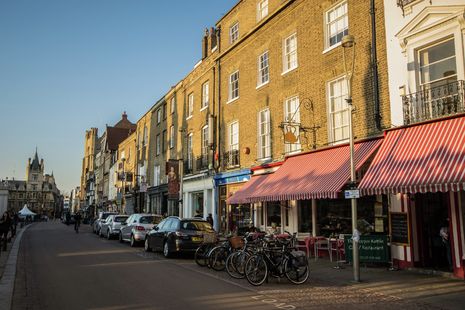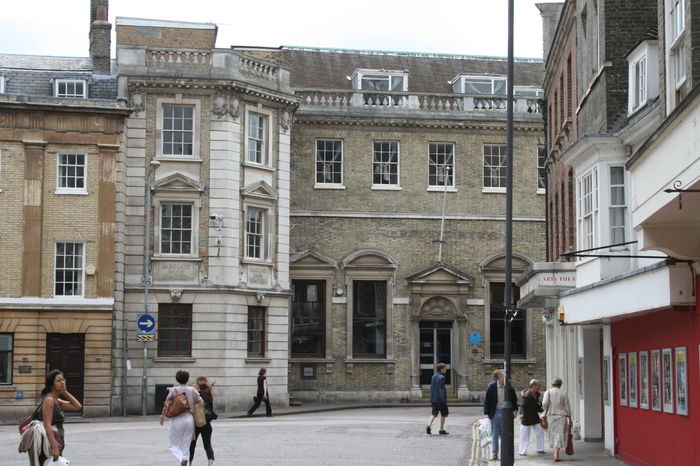The Coronavirus pandemic requires Cambridge University to acknowledge its local responsibilities
Stella Swain and Ayse Polat argue that Cambridge University needs to do more to serve its local community, as coronavirus lays bare the disparities of one of the UK’s most unequal cities.

Coronavirus is not a natural disaster nor an “apolitical” crisis. We are not “all in this together”. The effects of this virus have only highlighted the inequalities endemic to our society: from the fact that a disproportionate amount of BME people are dying due to economic inequality and institutional racism, to the rough sleepers who have no house to isolate in, yet are being harassed by the police, and the domestic abuse victims locked inside with their abusers, with no recourse to safe refuge.
Meanwhile, Jeff Besos is on track to become the world’s first trillionaire.
These inequalities are no accident. Over the past decade homeless shelters, migrant support organisations and places of refuge for survivors of domestic violence have been systematically defunded. The logic of austerity puts profit before people, and has long gutted this country’s welfare and public health services in favour of streamlining a competitive economy. The rich get ever richer. The poor are abandoned in their ever-growing numbers.
"We can no longer afford to pretend that we exist in isolation..."
It is in this very same neoliberal UK that we see the second highest death rate in the world. This death toll is not an accident: the government and other institutions continue to fail their people by thinking and acting with only profit in mind. Lack of widespread testing, missing PPE for frontline workers, and policy roundly criticised by unions for putting workers’ lives at risk are all symptomatic of the fact that those in power are not prioritising the lives of the vulnerable, even during a global pandemic.
We can no longer afford to pretend that we exist in isolation, or think of ourselves as distinct from the more marginalised members of our society. This is what it means to think about public health: we are only as safe and healthy as the person we walk past on the street. In the absence of a political leadership, it falls to our communities to pursue and implement measures to protect people. Universities, especially those like Cambridge, have power. They also have a choice. Either they can behave as corporations and sacrifice the wellbeing of the society in which they exist in favour of the wealth that they desire to generate, or they can show that they understand that they're part of a community, an entire city, and work to protect it.
Cambridge University uniquely imprints on the city it shares its name with; from its industry and employment to its very landscape. If you look at a map of Cambridge but block out the areas you can't enter without a CamCard, the town becomes pitted with blank spaces, areas that make up the town but only those privileged enough to be part of the University can enter. All this, in a town repeatedly described as the most unequal and one of the worst for homelessness in the country.
"During this crisis we need to show that we care about our community, and that this University values the town in which it is embedded."
Oxford colleges have already been working with their local council to house the homeless, and some Cambridge colleges are now pursuing a similar course of action. If colleges work with the council they can ensure that the rooms currently sitting empty are used to house those who otherwise would be on the streets. Cambridge University's capital investments can be put on hold; now is the time to show that we know we are part of a community and to help provide shelter so that people do not die on the very edge of the University’s walls.
Education at its best is supposed to provide a vision for the society we wish to see. As a place of education which aims “to contribute to society through the pursuit of education, learning and research at the highest international levels of excellence", surely Cambridge should be at the forefront of re-imagining the possibilities of a better, kinder world. There will be no “back to business as usual”, and there shouldn’t be! During this crisis we need to show that we care about our community, and that this University values the town in which it is embedded. Indeed, University staff and students will not be exempt from the impact of the COVID crisis, but it will be the BME, the working-class, the migrant staff and students, those who have no home other than Cambridge, who - as ever - will be the most negatively impacted.
We will eventually come back to pack the halls, the libraries and the lecture theatres. We will carry with us, however, the pain of having lost so many lives; people whom we knew, whom we loved, and whom we will never get to meet. But for now, colleges can, and should, make use of their empty rooms and offer a roof to those without one: the homeless, those escaping domestic violence, migrants and those released from detention centres. These should be offered for free, unconditionally and without surveillance, to all those who need it, and the University should use its position of power and influence in the town to act to end homelessness in the long term.
The least we can do at this time, the least that Cambridge University can do, is to try and give those in need a place to survive, time to heal, and a future that is worth living for.
Sign our open letter here in support of Sanctuary Housing: bit.ly/CAMSANCT
 News / Judge Business School advisor resigns over Epstein and Andrew links18 February 2026
News / Judge Business School advisor resigns over Epstein and Andrew links18 February 2026 News / Gov grants £36m to Cambridge supercomputer17 February 2026
News / Gov grants £36m to Cambridge supercomputer17 February 2026 News / CUCA members attend Reform rally in London20 February 2026
News / CUCA members attend Reform rally in London20 February 2026 News / Union speakers condemn ‘hateful’ Katie Hopkins speech14 February 2026
News / Union speakers condemn ‘hateful’ Katie Hopkins speech14 February 2026 News / Hundreds of Cambridge academics demand vote on fate of vet course20 February 2026
News / Hundreds of Cambridge academics demand vote on fate of vet course20 February 2026










